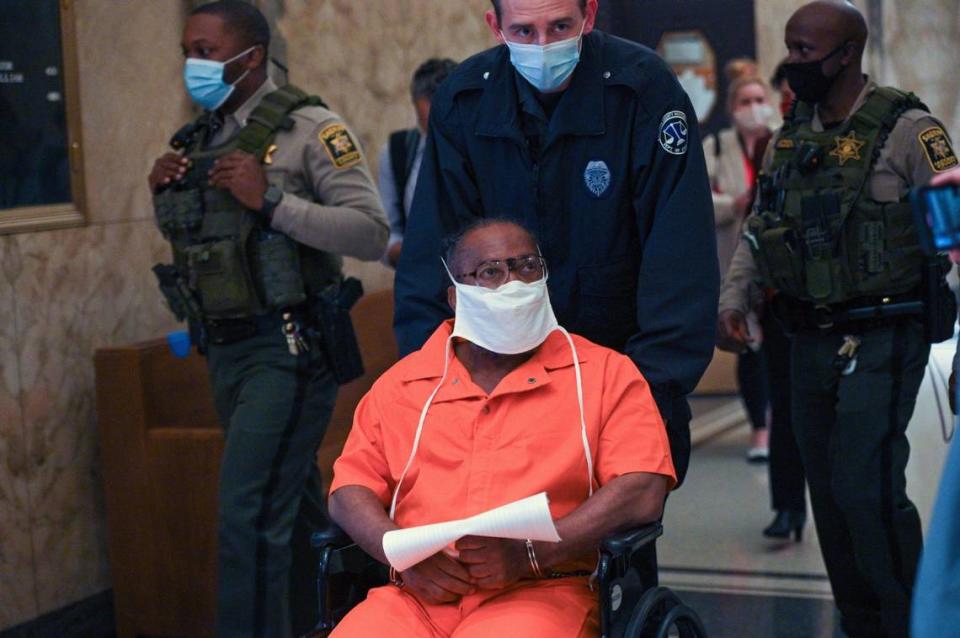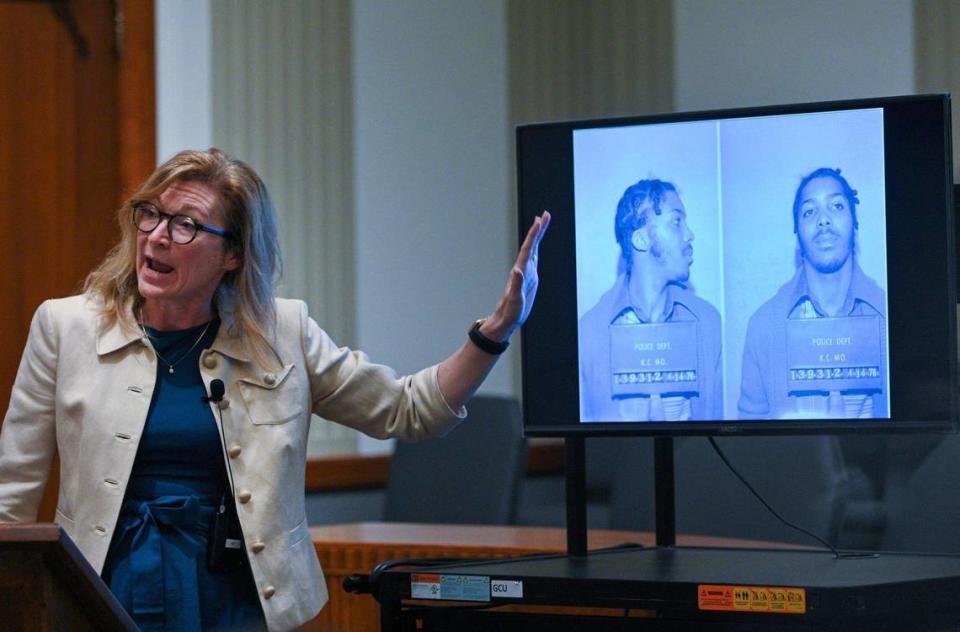‘I have nothing’: Kevin Strickland will soon be freed, but won’t get a dime from Missouri
- Oops!Something went wrong.Please try again later.
Kevin Strickland — who a judge on Tuesday confirmed has suffered Missouri’s longest known wrongful conviction — will not receive any compensation from the state for his more than 42 years behind bars.
Judge James Welsh ordered the release of Strickland, 62, after Jackson County prosecutors, using a new state law, argued he was innocent in a 1978 triple murder in Kansas City and should “not remain in custody a day longer.”
In Missouri, the wrongly convicted are almost always spit out of the system with nothing from the government that imprisoned them. Instead, they rely on nonprofits and other exonerees to get back on their feet, post-conviction lawyers say.
That’s because Missouri’s compensation law only allows for payments to prisoners who prove their innocence through a specific DNA testing statute. That was not the case for Strickland, or most exonerees across America.
Unlike guilty prisoners, a parole officer will not help Strickland find counseling, housing or work. And unlike exonerees in some other states, he will not be eligible through a compensation package for social services, such as participating in the state’s healthcare program.
Strickland previously told The Star that he plans to stay with one of his brothers for a short time. During an interview with ABC News, he quipped about having so little that he might use a cardboard box to “get up under a bridge somewhere.”
The reporter asked if he was being serious.
“I mean, what do I have?” asked Strickland, who now uses a wheelchair. “If they would tell me to roll out now, they’d take this chair. I’d have to crawl out of the front door. I have nothing; I have nothing.”

Sean O’Brien, a University of Missouri-Kansas City law professor who has helped free innocent prisoners, said Missouri should adopt a compensation law similar to the one in neighboring Kansas, which in 2018 passed a measure making the wrongly convicted eligible to receive $65,000 in compensation for each year they were incarcerated.
For Strickland, that law would have made him eligible for more than $2.7 million.
In other recent exonerations in the area, Kansas paid Lamonte McIntyre $1.55 million for serving 23 years for two murders he did not commit in Kansas City, Kansas.
Local attorneys say they tend to see Kansas exonerees fare better than those in Missouri. In the Show Me State, “if exonerees are doing well, it’s in spite of the system, not because of it,” said O’Brien, who has worked with 17 exonerees.
In Missouri, the only way Strickland will receive compensation is if lawmakers pass a bill ordering the state to pay him, legal experts say. Exonerees can also sue, but they have to show that police or prosecutors acted in bad faith, which is an uphill battle.
Instead, Strickland will rely on an online fundraiser that had, as of recently, raised about $50,000. That’s around $900 for each year he was behind bars, donated by everyday citizens.
In a previous interview with The Star, Jackson County Prosecutor Jean Peters Baker said there is “no doubt” Missouri should broaden its compensation law. There must be a better model, she said, than providing exonerees “nothing.”
“Especially when the system knows it made the mistake,” Baker said in June.
‘Lost years’
During a rally in August, state Rep. Richard Brown said Missouri has “one of the strictest compensation laws in our nation.”
Missouri prisoners who prove their innocence “solely as a result” of DNA testing are entitled to money, but they are not if they win their freedom with DNA another way. For the eligible few, they are entitled to $100 for each day they were imprisoned, which experts say is less than what other states pay.
The federal standard for compensation is $50,000 for each year of wrongful imprisonment. The majority of states with a compensation law, including Indiana and Alabama, provide that or more. In Texas, exonerees are eligible to $80,000 for each year behind bars.
Missouri, however, caps the payments at $36,500 a year, so if a person was imprisoned for 10 years and proved their innocence through the DNA statute, the $365,000 they are owed would be spread out over 10 years. That’s a problem, innocence advocates say, because the state does not pay interest and because payments are terminated upon the exoneree’s death.
“Suppose you were exonerated after 20 years in prison. Why should you have to wait another 20 years before receiving the full compensation that Missouri provides?” asked Jon Eldan, founder of After Innocence, a nonprofit that has helped more than 800 exonerees across the U.S. “And if you do not live that long, why should the state keep the money you were promised?”
It would mean that if Strickland qualified for compensation, which he does not, he would have to live to be 104 to receive all of the compensation owed to him.

Fifty people have been exonerated in Missouri, including defendants acquitted at retrials and prisoners declared actually innocent. At least 15 were freed with the assistance of DNA. Some of them were not compensated.
Even if a prisoner is compensated through the DNA statute, they are then barred from filing a lawsuit, which could reveal wrongdoing through discovery. The civil process, lawyers say, could help identify bad actors in the legal system.
At the rally, Brown, a Kansas City Democrat, vowed to introduce legislation that would ensure the wrongly convicted, whether freed through DNA or other means, are compensated. It would include access to job training and health services, he said.
“Is this too much to ask?” Brown said. “Someone who was innocent of a crime and lost years off their life.”
A person in the crowd responded: “No, it’s not.”
Brown noted that an online fundraiser for Lamar Johnson, who has served 26 years for a 1994 murder that St. Louis prosecutors say he did not commit, has raised about $3,000.
“Congratulations, Mr. Johnson,” Brown said sarcastically. “When you are released, you will have enough money to be counted among our citizens who live in poverty.”
Nobody there to help
Tricia Rojo Bushnell, executive director of the Midwest Innocence Project, has seen exonerees struggle. Unlike guilty prisoners, she said, they don’t get a caseworker to help them find a job or obtain an identification card.
“How do you return to the world when nobody is there to help you?” she asked.
The Missouri Department of Corrections said exonerees don’t get help from parole officers because they are not under that form of supervision, which “comes with many, many restrictions.” But its spokeswoman, Karen Pojmann, said there are resources in prison that aim to assist people in re-entering society, including vocational education programs and parenting courses.
Pojmann sent The Star a timeline of preparations taken before a prisoner is released, which includes a 30-day pre-release job placement. She said former prisoners, regardless of how they were released, can also contact the Office of Reentry Services.
“Someone who has been exonerated might not have enough advance notice to progress through this timeline, but the resources, including community resources, are available nonetheless,” she said.

Strickland’s exoneration marked the seventh longest wrongful imprisonment confirmed in U.S. history. Strickland, who was 18 when he was arrested, spent more than 42 years and four months ago in prison.
The country’s longest serving exoneree, Anthony Mazza, survived 47 years and two months in prison in Massachusetts before he was freed earlier this year.
America’s second longest serving exoneree, Richard Phillips, was incarcerated for 45 years and two months for a Detroit murder he did not commit.
Michigan awarded Phillips more than $1.56 million in compensation.

